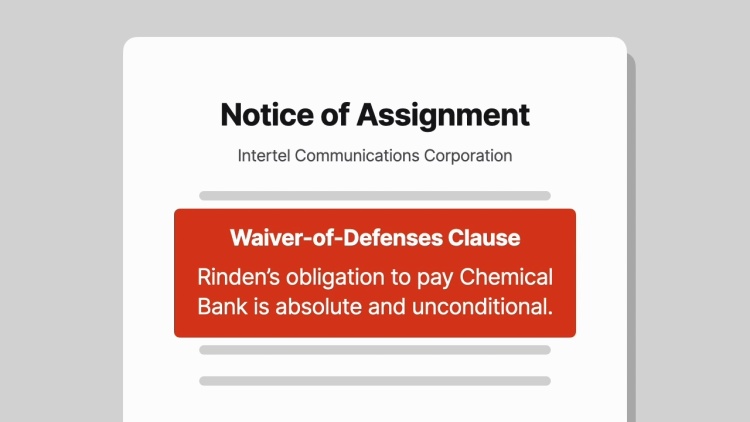Chemical Bank v. Rinden Professional Association
New Hampshire Supreme Court
498 A.2d 706 (1985)

- Written by Christine Hilgeman, JD
Facts
Intertel installed an office telephone system for a law firm, Rinden Professional Association (Rinden) (defendant) pursuant to a lease/purchase contract, under which Rinden would make monthly payments up to a certain date. Subsequently, Rinden received a notice that Chemical Bank (Chemical) (plaintiff) planned to purchase the payment rights from Intertel. This document required Rinden's consent to make payments to Chemical and provided, in part, that Rinden agree that this obligation would be “absolutely unconditional” and payable whether or not the lease was terminated, notwithstanding any defenses or claims it had or may have against Intertel. Rinden's office manager consented to the notice document after which Chemical Bank paid Intertel $8,800 for the assignment of Intertel's right to receive payments from Rinden. After three years of making payments to Chemical, the phone system developed serious malfunctions. Rinden replaced the phone system and refused to make further payments. An action was then commenced and the evidence was reviewed by a special master who issued a report in favor of Chemical. Intertel, in the meantime, went into bankruptcy. Representatives of Chemical testified at trial that Chemical and Intertel were not interrelated and that Chemical’s investigation of the Intertel account revealed no claims or defenses regarding the lease/purchase agreement. Rinden appealed.
Rule of Law
Issue
Holding and Reasoning (Douglas, J)
What to do next…
Here's why 906,000 law students have relied on our case briefs:
- Written by law professors and practitioners, not other law students. 47,100 briefs, keyed to 995 casebooks. Top-notch customer support.
- The right amount of information, includes the facts, issues, rule of law, holding and reasoning, and any concurrences and dissents.
- Access in your classes, works on your mobile and tablet. Massive library of related video lessons and high quality multiple-choice questions.
- Easy to use, uniform format for every case brief. Written in plain English, not in legalese. Our briefs summarize and simplify; they don’t just repeat the court’s language.





